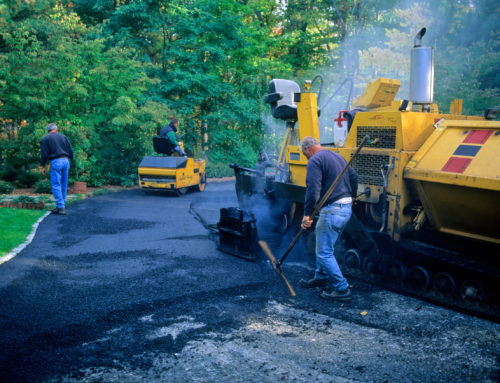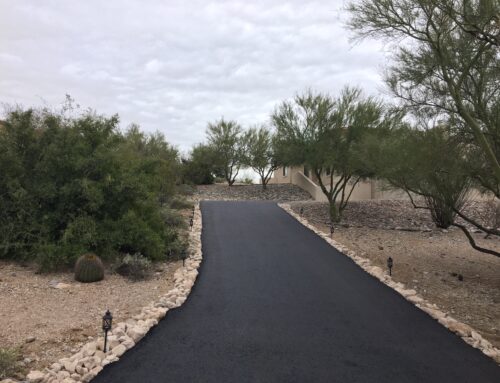As summer thoroughly heats up here in Arizona, the temperatures begin to rise, and the demand for asphalt paving projects rises too. However, asphalt paving contractors and the public must understand the importance of summer asphalt safety. The scorching heat, intense sunlight, and other environmental factors can significantly impact the quality and longevity of the job. This blog will discuss essential safety measures and best practices to ensure smooth and safe pavement during the hot summer.
Summer Asphalt Safety: Ensuring Smooth and Safe Pavement
Understanding the Impact of Heat
The extreme heat in Arizona poses unique challenges to asphalt paving. As temperatures soar, asphalt becomes more pliable, making it susceptible to damage from heavy equipment, vehicular traffic, and even foot traffic can make an impression on asphalt that’s too hot. The combination of high temperatures and the weight of vehicles can lead to surface deformation, such as ruts, potholes, and cracking.
To mitigate these risks, asphalt paving contractors must pay attention to temperature forecasts, schedule work during cooler periods (early morning or late afternoon), and implement proper cooling techniques to maintain the asphalt’s integrity.
Protective Measures for Workers
Working under the scorching sun can pose significant health risks to asphalt paving crews. Heat-related illnesses, such as heat exhaustion and heat stroke, can be life-threatening if not addressed promptly. To protect workers, it is vital to implement the following safety measures:
Hydration: Encourage workers to drink plenty of water before, during, and after work. Provide access to cool water on-site and schedule frequent breaks in shaded areas.
Protective clothing: Ensure workers wear lightweight, breathable clothing, including long-sleeved shirts, wide-brimmed hats, and sunglasses. The longer sleeves and hat protect the body from getting blasted by any more sun than is necessary, which helps prevent overheating. Additionally, apply sunscreen with a high SPF to exposed skin.
Training and awareness: Train workers to recognize the signs of heat-related illnesses and provide them with the knowledge to respond appropriately. Encourage them to look out for each other and report any symptoms promptly.
Surface Preparation and Cooling Techniques
Proper surface preparation is crucial for ensuring the longevity of asphalt pavement, especially during the hot summer. It involves cleaning the existing surface, removing debris, and repairing any damage. Additionally, employing cooling techniques can help mitigate the effects of extreme heat on freshly laid asphalt. Some effective methods include:
Water application: Spraying the existing pavement with water before applying the new asphalt helps cool the surface and prevent premature curing. It also reduces the risk of thermal cracking.
Temperature control: Monitor the temperature of the asphalt mixture during transportation and placement. Adjusting the mixture’s temperature and compaction rate helps optimize performance and prevent deformation.
Shade and insulation: When possible, use shade structures or cover freshly laid asphalt with insulated blankets to minimize exposure to direct sunlight. This protects the asphalt from excessive heating and allows for proper curing.
Traffic Management and Safety
Managing traffic during asphalt paving projects is another crucial step to ensure the safety of both workers and the public. As we mentioned earlier, the warmer temperatures mean asphalt is more susceptible to damage, needing proper traffic control measures, such as signage, barricades, and flaggers, to help maintain a safe work zone. It is essential to communicate temporary traffic diversions and restrictions effectively to minimize inconvenience and ensure the smooth flow of vehicles.
Moreover, clear and visible signage must be placed to alert drivers of potential hazards, changes in road conditions, and reduced speed limits. Properly marking work zones with reflective materials and providing adequate lighting during nighttime operations are also essential for driver safety.
Education and Public Awareness
Educating the public about summer asphalt safety is essential to prevent accidents and promote responsible driving. Raising awareness through local media, community events, and social media platforms can help residents understand the importance of adhering to traffic rules and exercising caution around construction zones.
As asphalt paving contractors in Tucson, we are responsible for prioritizing safety during the summer months. By understanding the impact of heat, implementing protective measures for workers, employing proper surface preparation and cooling techniques, managing traffic effectively, and promoting public awareness, we can ensure smooth and safe pavement that withstands the challenges of summer. Together, we can create a safer and more durable infrastructure for our community.



